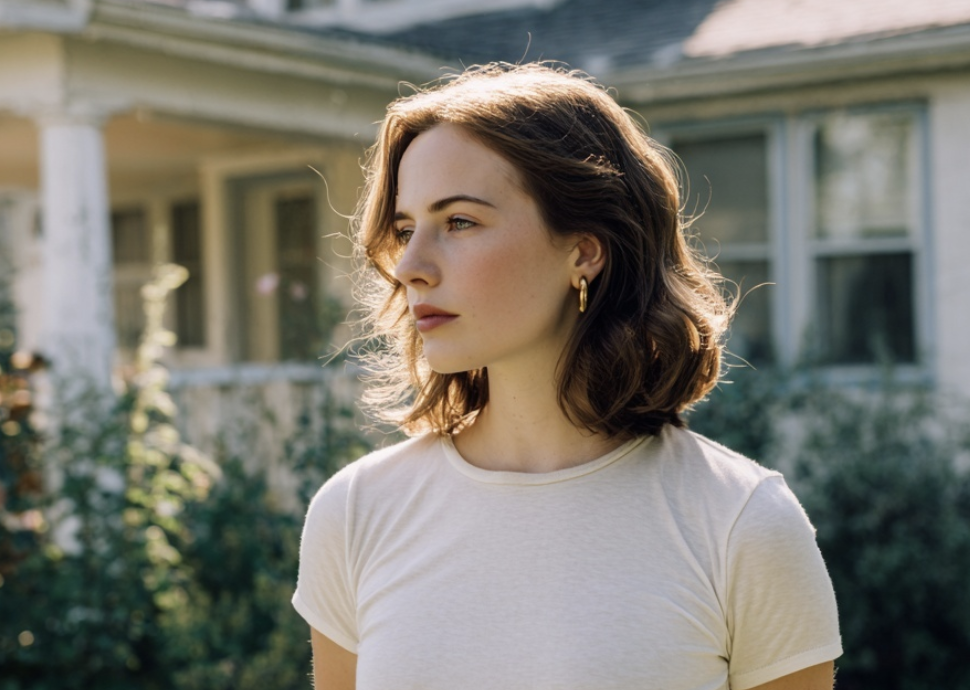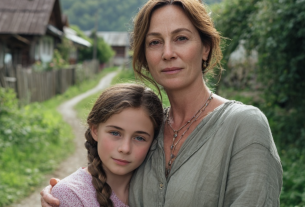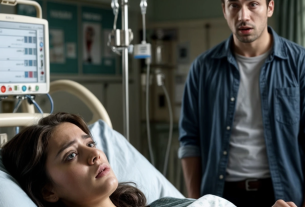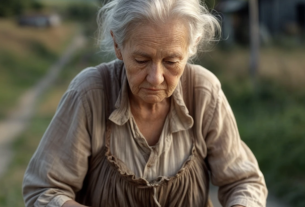“Your family — complete paupers, homeless in ragged clothes with empty plates!” Oleg spat venomously, as if he had just spat toward the kitchen, his fingers gripping the TV remote tightly. Each press of a button felt like a sharp, hostile strike — as if the device itself was to blame for his bad mood.
I stood by the table, carefully placing the plates as if building a barricade out of porcelain. In my mind, I repeated like a mantra: one, two, three… seven, eight, nine… Eight years of marriage — not just a number. Eight years filled with patience, burned inside me like paper in a fire. Eight years during which I learned to accept humiliation with calm gratitude, as if they were not insults but some strange form of care.
“Especially your Aunt Sofia,” he continued without taking his eyes off the screen, where bright commercials flashed. “She always comes with that pathetic cake from Magnit, like it’s some celebration. As if we can’t afford real desserts! And herself? Works in her dump on the outskirts, clipping old ladies’ nails for pennies. What a lifestyle!”
I clenched my fists under the table, my nails digging into my palms. Each word was a needle piercing my heart. But I stayed silent. Silent because over the years I had learned to be invisible in my own home.
Suddenly, light hurried footsteps echoed in the hallway — the children were back. Kirill, my ten-year-old son, and Alisa, our little artist, burst into the apartment laughing, cheeks flushed from the winter walk. I felt relief — as if fresh air had blown into the room, clearing the heavy atmosphere.
“Dad!” Alisa shouted, running to the couch with a sheet of paper in her hands. “Look, I drew Aunt Sonya and me!”
The drawing showed two figures: a woman with gray hair in an old-fashioned scarf, and a girl in a pink coat. Between them was a huge sun drawn in orange crayon, so bright it seemed to shine not just on paper, but right into the room.
“Well done,” Oleg grunted without looking away from the screen. “But enough with these grandmas. Better draw Dad. Or the new car I’ll buy soon when I become head of the department.”
Alisa froze. Her eyes dimmed as if someone had switched off the light inside. I felt a lump tighten in my chest — not just from hurt for my daughter, but from my own helplessness.
“Very pretty, sunshine,” I quickly said, taking the drawing and kissing Alisa on the crown of her head. “Let’s hang it on the fridge? It will remind us how talented you are.”
Kirill, already too grown-up for his age, looked into the pot on the stove.
“What’s for dinner?”
“Your mom’s diet horror again,” Oleg cut in with clear sarcasm. “Chicken breast, buckwheat, steamed vegetables… Like we live in a nursing home, not a normal family.”
“It’s healthy,” I answered evenly. “We’re saving on unnecessary expenses. And health is most important.”
“Yeah, sure, saving!” He raised his voice sharply. “Because your father is a loser who can’t help his own daughter, and your pensioner aunt only gives you old books and pathetic gifts!”
The children froze. Kirill looked at me, then at his father — in his eyes was a question: Why are you silent? Why don’t you protect us?
I put the salad bowl on the table with such force that several tomato cubes jumped onto the tablecloth, leaving red spots like blood.
“Oleg,” I said quietly but firmly. “Enough.”
“Enough what?” he snapped, turning sharply to me. “Telling the truth? You all live in illusions! Remember, kids,” he added turning to them, “if you don’t want to live in poverty like Mom’s relatives, learn to earn, not dream about grandma’s cakes!”
At that moment, I looked at Kirill. He didn’t look away. In his eyes was no childish resentment, but adult understanding. He saw everything. Saw how his father humiliated his mother. Saw how I pressed my lips to keep from crying. And at that moment I felt unbearably ashamed. Not for the ‘poor’ family. Not for Aunt Sonya. But for myself. For my silence. For letting this go on for years.
My apron pocket vibrated — a phone message from Aunt Sonya:
“Sunshine, come by tomorrow. We need to talk.”
I didn’t know then that it would be the last time I’d see her alive.
Aunt Sofia died two weeks later. Quietly, in her sleep, just as she lived — modestly, without noise or demands. As if she didn’t want to disturb anyone, even in death. At the funeral, Oleg stood nearby, glanced at his watch twice, as if rushing to meet someone more important. When I broke down and cried, he hissed in my ear:
“Enough already! It’s not your mother who died, really!”
He never knew what we talked about that last day. I still remember her kitchen — warm, smelling of tea and cinnamon. She complained about her heart, but not with sorrow, rather with a light sigh, as if it was just an inconvenience. Then she brewed strong tea in an old porcelain teapot with a chipped spout, took homemade cookies from a tin box, and looked at me — piercingly, as if seeing right through me.
“Marina,” she said simply. “You are unhappy.”
Not a question. Not a guess. A statement. Like a diagnosis.
Then she hugged me — thin arms, lavender scent, warmth I hadn’t felt since childhood.
“But everything will change,” she whispered. “I know.”
At the time, I thought it was just the words of a dying woman. Comfort. Hope.
But she was right.
A month after the funeral, I was called to the notary.
“You are the sole heir of Sofia Mikhailovna Verkhovskaya,” announced the woman in a strict black suit, looking at me over her glasses. “You inherit ownership of a non-residential property of 78 square meters at Leninsky Prospect, 42. It houses the beauty salon ‘Sofia.’ Also — a bank deposit in the amount of…”
The number she named made me stagger. I gripped the armrests of the chair, afraid to fall. My heart pounded. My head was full of noise, like the roar of surf.
“There must be a mistake,” I breathed. “Aunt couldn’t have had so much money. She lived so modestly…”
The notary smiled slightly.
“Your aunt was a very wise woman. The salon operated steadily. She didn’t spend extra. She invested everything. For fifteen years. Not a single extra ruble for herself. Only for the future.”
I walked outside holding the folder of documents as if it was a new life. The air was sharp, cold. I breathed in — and for the first time in many years felt I could breathe freely. That I had a choice. A real choice.
That evening, after the children slept, I told Oleg — only about the salon. Not a word about the money. His face changed instantly. The contempt disappeared, replaced by greedy interest.
“Well, well, well,” he said, putting down his phone. “And how much is this shed worth?”
“It’s not a shed,” I said, and for the first time in years felt something awaken inside me. Pride. Strength. “It’s a business. In the city center. With regular clients. With a reputation.”
“We’ll sell it,” he decided. “Or transfer it to me. You have no experience. You’re not a businesswoman.”
In the past, I would have agreed. Bowed my head. Given everything. To avoid conflict. To keep silence in the house.
But now — Aunt Sonya’s voice rang in my ears: “Everything will change.”
“No,” I said quietly.
“What?” he didn’t understand.
“No. I won’t sell it. And I won’t transfer it to you.”
He laughed — loudly, like at a stupid joke.
“Marish, are you crazy? What kind of entrepreneur are you? You can’t even handle the kids without my orders!”
“I can,” I raised my eyes. For the first time in a long time, I looked him straight in the eyes. “I handle the kids. I run the house. And I will handle the salon.”
His face twisted — first a smirk, then irritation, then anger.
“Stop this clowning around! Tomorrow we’ll go to a lawyer and make a power of attorney. I’ll take care of everything.”
“No,” I stood up from the couch. “This is my aunt’s inheritance. It’s my choice. It’s mine.”
He hit me.
Click — and the sound echoed through the silent apartment like a gunshot. I felt burning on my cheek. At the doorway — Alisa. Her eyes full of horror.
“Mommy?”
“Go to sleep, sunshine,” I said evenly, though everything inside screamed. “It’s okay. Dad and I are just talking.”
When she left, Oleg grabbed my shoulders.
“Are you completely out of your mind?! I slave away like a horse, feed you all, and you do this to me?”
I looked past him — at the crack in the wallpaper running along the wall like a river through a desert. I wondered how long it had been there. Why hadn’t I noticed before?
“Do you hear me?” he shook me.
“I hear you,” my voice was calm. “And now you will hear me. Never again — not once — dare to raise a hand against me. Never dare to humiliate my family. And tomorrow I’m going to the salon. Alone.”
He let me go as if I had suddenly become a stranger.
“What happened to you?”
I touched my cheek. The pain was sharp. But inside — silence. And strength.
“Nothing happened to me,” I said. “I just finally understood: you have no right to call my family paupers when my ‘poor’ aunt left me a business and money you won’t earn in five years. And you — you don’t even deserve to touch what she preserved for me.”
His face flushed a dark crimson, as if blood rushed to his head, veins in his temples pulsing like they might burst. He stood before me, fists clenched, breathing heavily like a trapped animal.
“How much?” he hissed, barely holding back anger.
I named the number. Not a whisper, not trembling, but clearly, distinctly, as if swearing an oath. Silence fell in the room. Even the ticking clock stopped.
Oleg whistled — first quietly, then louder, as if trying to exhale shock. And suddenly laughed — nervously, wildly, like a man who cannot believe reality.
“Well, see!” he exhaled, rubbing his forehead. “Especially — you can’t just keep that money! You have to manage it wisely! I know where to invest, what projects to launch, where to earn even more! I have connections, you know?”
“No,” I said. One word. Firm as stone.
“What do you mean ‘no’?!” he roared, grabbing the edge of the table. “You’re my wife! That’s our money! We’re family!”
“It’s not joint money,” I replied, my voice calm, as if reading aloud from a law textbook. “By law, inheritance received during marriage is not considered jointly acquired property. It belongs to me. Only me. And I will no longer let you decide for me. Not for me, not for my children, not for my life.”
He looked at me as if a ghost stood before him. A stranger. A woman he didn’t recognize. His lips trembled.
“You’ve been replaced,” he whispered. “You used to be normal. Calm. Submissive.”
“I used to be scared,” I said, and at that moment felt something break completely inside — not my heart, but chains. “I was afraid of conflicts, afraid of loneliness, afraid that without you I could do nothing. But I’m not afraid anymore. It’s over.”
He shouted something in response — threats, accusations, meaningless words — but I didn’t listen anymore. I stood by the window, looking at the dark city, feeling for the first time in eight years my breath was deep, free.
All night I didn’t close my eyes. I heard him pacing the apartment — heavy steps, slamming doors, the clink of a bottle as he opened whiskey, the clatter of a glass as if trying to drown his thoughts in alcohol. I lay in the dark, counting each breath, each heartbeat. And understood: I’m not afraid anymore. Not of his anger. Not of loneliness. Not of change.
In the morning, he left the bedroom with a swollen face, red eyes, hair tousled as if he spent the night fighting. He stopped in the doorway, saw me in the hallway with a bag in my hands.
“We haven’t finished talking,” he croaked.
“We have,” I said. “I’m going to the salon. And maybe I won’t come back.”
The ‘Sofia’ salon greeted me not with the old door and smell of dust as I remembered, but with light, cleanliness, and the scent of essential oils. Spacious room, modern chairs, full-length mirrors, soft lighting — everything spoke of professionalism, of care. Four masters — two hairdressers, a manicurist, and a cosmetologist — met me cautiously, but not hostilely. In their eyes — hope.
“Sofia Mikhailovna loved you very much,” said Vera, the administrator with short hair and sharp eyes. “She said: ‘When I’m gone, Marina will continue my work. She’s stronger than she thinks.’”
I felt a lump rise in my throat.
“I know nothing about salon business,” I admitted honestly. “I don’t even know where to start.”
“But I know,” Vera smiled. “I’ve been here ten years. And Sofia Mikhailovna left detailed instructions — on calculations, schedules, supplies, even social media management. She thought of everything. Down to the smallest detail.”
I walked through the salon, touching the chairs, mirrors, shelves with cosmetics. Each item was like a letter from her. A reminder: “You are not alone. I believed in you.”
Of course, she had thought it all out. Even how to help me break out of the cage I had built myself — of fear, dependence, and silence.
That evening I came home late. Oleg was waiting, sitting in the chair like a judge on a throne. He started talking — about ‘family values,’ about ‘unity,’ about how ‘we must decide together,’ that my ‘rebellion’ was destroying the family, that ‘the children would suffer.’
“You destroyed our family,” I interrupted, standing in the hallway with a suitcase in my hands. “For years. With every word. Every humiliation. Every look where I was nothing to you. You didn’t just tell the truth — you built your self-esteem on my humiliation.”
“I was honest!” he shouted.
“No,” I said firmly. “You were cruel. You made me small to feel big. But I am no longer your shadow. And I won’t let you do the same to my children.”
He rushed to the closet, grabbed the keys.
“And where are you going? To the loser dad? To that old aunt who left you her junk?”
“To Aunt Sonya’s apartment,” I said. “Now it’s mine. And the junk, as you call it, is the legacy of a woman who was richer in spirit than you will ever be. The children are coming with me.”
“You’re dreaming!” he shouted. “You won’t take them! I’ll go to court!”
Kirill came out of the room. He held Alisa’s hand; her eyes were red from tears, but she was not crying. She looked at me — and in her gaze was love. And trust.
“We want to be with Mom,” Kirill said. His voice was firm, like an adult’s. “We already packed. And we don’t want Dad to yell at Mom again.”
Oleg froze. He looked at his children — and for the first time, it seems, he saw them. Not as extensions of himself, but as separate people. People who chose me.
Six months passed.
Aunt Sonya’s small apartment became our new home — cozy, warm, filled with laughter and children’s drawings on the walls. I turned one room into an office where I learned bookkeeping, studied marketing, talked with suppliers. The ‘Sofia’ salon not only survived — it flourished. I increased the staff, launched a loyalty program, started managing social media. And after four months opened a second salon — in a residential area where prices were more affordable but quality remained high.
Oleg initially threatened court, tried to contest the inheritance. Then called, offering to ‘forget everything,’ to return ‘as a family.’ Now he only calls for business: arranging meetings with the kids, clarifying who will take Alisa to piano, who picks Kirill up from rehearsals.
I don’t hate him. I just don’t fear anymore.
Today I sit in a café across from the salon, drinking cappuccino and watching clients enter ‘Sofia’ — some tired, some anxious, others just seeking beauty. And leave — with lightness in their shoulders, with smiles. I feel pride. Not for money. Not for success. But for doing it myself.
My phone vibrates. A message from Vera:
“The team finished the renovation. Tomorrow you can welcome the first clients in the new hall.”
I send a heart emoji and close my eyes. For a moment, I feel her — a warm hand on my shoulder, the light scent of lavender. And a voice, quiet as the wind:
“See? I told you — everything will change.”
When the waitress brings the bill, I look up — and notice a young man at the next table looking at me. Not boldly. With interest. With respect.
Before, I would have looked down. Felt embarrassed. Shut down.
Now I just smile back. Straighten my shoulders. Lift my spine.
Because I am no longer who I was.
I am a woman who survived. Who stood up. Who began.
And my story is just beginning.



